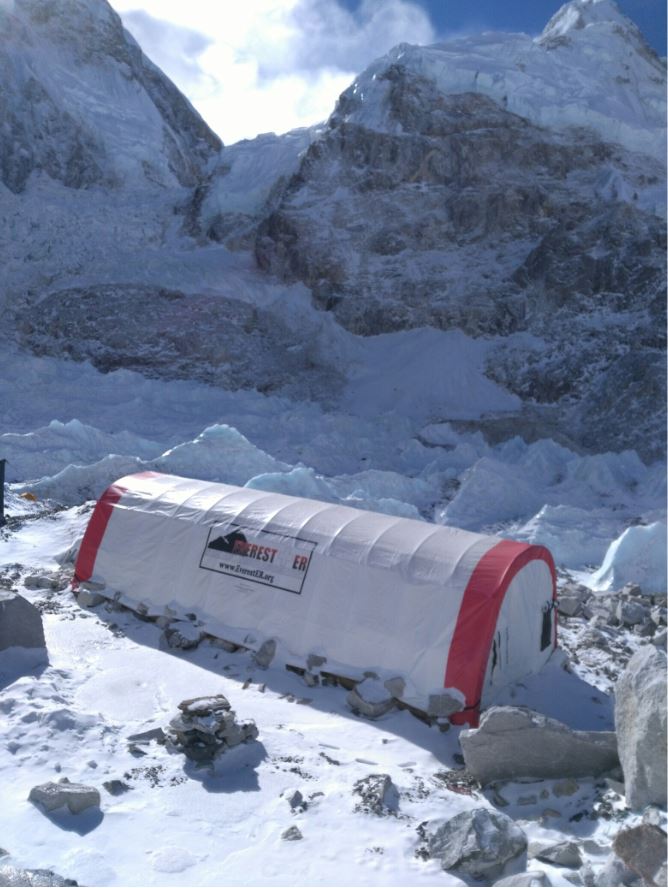Episode 2: Into the Sky
By: Dr Deonarain
“There’s no way we’ll fly today…” I had barely finished the sentence when a fantastic crack of lightning breaks the black sky. The reverberations of the thunder shake the hotel’s veranda. Heavy drops of rain drum down on the tin roofs in Thamel. The streets are deserted apart from a few street dogs sheltering themselves in darkened alleyways.
“Hahaha! You don’t think so?” Deirdre, my Everest ER colleague, cracks with a smile and wink.
We are scheduled to fly to Lukla today on a 7 am flight. It’s a few minutes past four in the morning and our guiding company, Wongshu Peak Promotions are due to collect us soon. I couldn’t fathom that the flight would be going ahead, not on a day like this and not to the ‘most dangerous airport in the world’ – or so it was known widely.
At 4:15 there are noises at the gate. The sleepy front desk clerk slips off his chair and stumbles to the front door. There is a brief and noisy exchange in Nepali and in an instant, the great iron hotel gate open. Unbelievably, the Wongshu van backs in through the gate and parked just metres from the hotel front door.
“Looks like we’re going!” I exclaim incredulously. Reflexively I stare at the enormous pile of luggage in the front foyer. Some bags for the base camp, some for the trek, others for delivery at the Himalayan Rescue Association’s high camp at Pheriche. Deirdre and I exchange blank stares for what seemed an eternity.
It wasn’t long before we are immersed in the chaos of the airport. A throng of people mill about all hopeful that the flights to Lukla would be running despite the weather. In fairness, the rain had settled and the electrical storm had fizzled out. Already the sky was shifting to the steel grey of morning. The planes were still grounded on the tarmac of the airport and we were still grounded in the crowded waiting lounge. Without warning, our flight is announced and we scramble towards the gate. Our group consisting of the Everest ER doctors, Deirdre, Pawan, and myself and about 20 other medical adventurers who are part of the Wilderness Medical Society CME expedition to Everest Base Camp. We joke nervously about the flight and Lukla airport as we are loaded onto a small passenger plane. After a quick safety briefing, we are airborne and over the sprawling expanse of Kathmandu, next, the verdant hills which ring Kathmandu and then angling ever higher towards the snowy Himalayan Range.

The scale of the scenes through the port windows grows exponentially. Giant mountains thrust up towards the heavens and all things on the ground lose their perspective. The small plane we are in is caught the updrafts from the range and bounces wildly. We exchange nervous glances but say nothing. Another rash of turbulence, and one of the WMS crew shrieks, another covers his face, a third looks around wide-eyed searching for reassurance. We can also see through the windows that the cloud cover is dropping, fast. In the low cloud, a landing at Lukla airport is impossibly dangerous. Unexpectedly, a gap appears the cloud and the pilot drops the plane through it. Lukla’s dangerously thin landing strip appears through the front window of the plane. The pilot and co-pilot are busy speaking, twisting knobs and dials, and lining up the still bucking plane to the airstrip, now only several hundred metres away. The strip itself is a few hundred metres long itself. My instinct tells me that we were coming in too fast. I slip into unease and checked my seatbelt. Within seconds the plane’s wheels strike the landing strip and immediately the plane bounces into the air again. The pilots wrestle it to the ground again and bring the plane to a near screeching halt just metres from the end of the airstrip. ‘Welcome to Lukla’ I thought. My next thought: ‘Thank God… each and every one of you.”

Dr Dinesh Deonarain is a Fellow of the Royal New Zealand College of Urgent Care who is in Nepal on assignment. He is volunteering for the Himalayan Rescue Association as one of the Everest ER base camp doctors for the 2019 climbing season. This blog follows his experiences in the high alpine of the Everest region.
Listen to the Profile in Urgent Care podcast with Dr Dinesh Deonarain.
If you would like to support Everest ER and the Himalayan Rescue Association, you can donate by bank transfer to: BNZ 02-0800-0196128-000. Also, you can follow Everest ER this season at www.EverestER.org
To read episode one, please click here.
